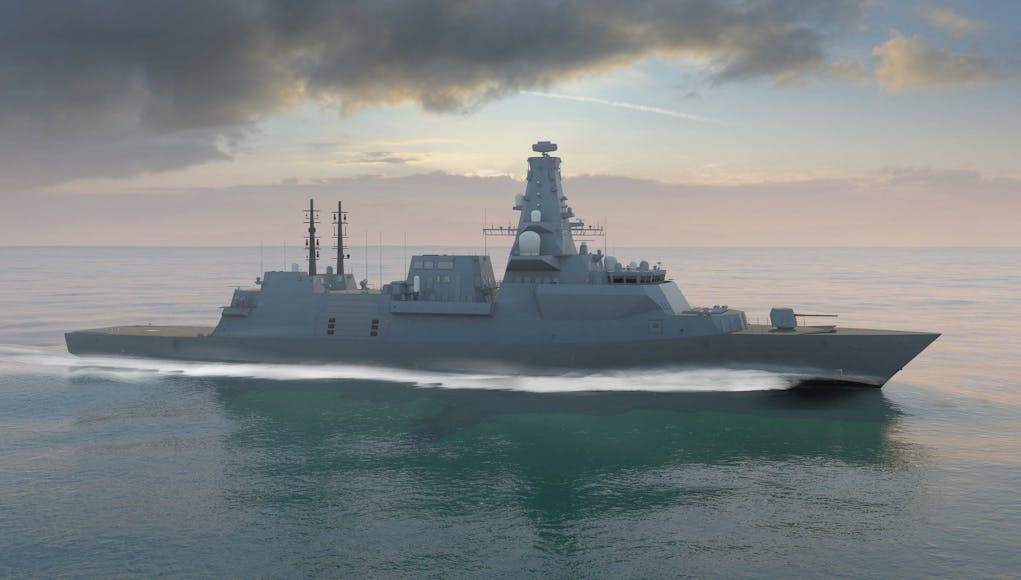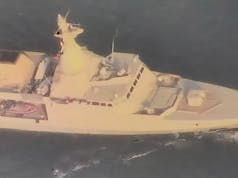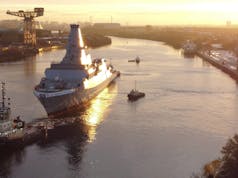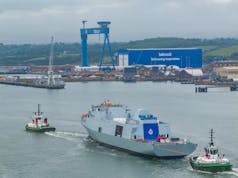Only 35% of the steel required to build each Type 26 Frigate will be sourced from the UK.
The reason for this, according to the government, is that the UK can’t produce the majority of steel types required. The news that 65% of the steel for the frigates will come from overseas is in sharp contrast to the fact that only 6% of the steel used in the Queen Elizabeth class came from outside the UK.
The information came to light from a written parliamentary question answered by MP Harriett Baldwin, Under Secretary of State for Defence Procurement:
“Responsibility for sourcing steel for the Type 26 Frigates rests with BAE Systems as the contractor. In accordance with Government guidelines on the procurement of steel, the company has run a competition to select a supplier of steel for the programme, and an announcement is expected shortly.
UK steel suppliers have been strongly encouraged to bid in line with the Government’s Procurement Policy Notice concerning the procurement of steel for major Government projects. This pipeline is published on GOV.UK. The MOD will continue to carry out early market engagement and forecast our steel requirements for shipbuilding through the UK Government Steel Pipeline.
We expect that around 35 per cent of the steel required to build each Type 26 Frigate will be sourced from UK suppliers in Scotland and Scunthorpe; approximately 1,400 tonnes per ship. For some grades of plate steel needed for the Type 26 Frigates the combination of thickness, size and flatness specifications means that the steel cannot be sourced in its entirety in the UK.”
A source in the Royal Navy, who wishes not to be named, told us via e-mail:
“It’s nothing new, the carriers were the last big ticket item we had that were mostly British. The new Dreadnoughts, the new OPVs will also feature mostly foreign steel. It’s disappointing but it’s either that or paying much more for the vessels.”
BAE explained to the UK Defence Journal today that the Type 26 programme requires a considerable proportion of ‘thin plate’ steel due to the nature of the warship. This thin plate steel cannot be sourced from UK steel suppliers.
BAE Systems ran an open and competitive process in line with UK government legislation and UK companies were invited to bid. Dent Steel UK based in Yorkshire has been selected to supply steel for the Type 26 programme.
A spokesperson told us:
“The steel we procure must meet the very specific technical specifications for the complex warships we deliver, as well as meet our customers’ needs in terms of availability timeframes and budgets.
We are pleased to confirm that, following an open competitive bid process, Yorkshire based Dent Steel UK has been selected to source steel for the first three Type 26 ships.
Steel for the Type 26 programme sourced by Dent Steel UK will come principally from mills in the UK and Sweden which can meet the very specific requirements for the warships. Approximately fifty percent of the value of steel for the first three Type 26 ships will be British; this equates to around 35% of the overall weight”.
This comes despite assurances from Philip Dunne last year, the then Minister of State for Defence Procurement, that the project would attempt to use mostly British steel. This was supposed to be made possible by encouraging contractors to follow new guidelines:
“In the main, Ministry of Defence (MOD) requirements for steel are sourced by our prime contractors taking into account cost, time and quality. The MOD has issued new policy guidance to ensure, as far as we are able to within EU procurement legislation and the Government’s overarching priority of value for money, that we are addressing the barriers that prevent UK steel suppliers from competing on a level playing field with international suppliers.
This emphasises the importance of increased pre-market engagement, including industry days and the signalling of future requirements for steel, bringing prime contractors and steel producers together to facilitate supply chain opportunities. I have also written to our main defence contractors to highlight the new policy guidelines and seek their assistance and support in implementing them.”
UK suppliers in the past have provided significant quantities of steel for major defence equipment procurement programmes and new government guidelines were supposed to help UK steel suppliers to compete effectively with international suppliers for major projects, this has not materialised.














This is yet another example of failure of Government to communicate and engage with industry. We need a planned national ship building strategy so British businesses and industry can coordinate resources, labour and compete for contracts. Our decommissioned ship’s should be scrapped and recycled into new ships as part of this strategy.
Surely the UK Government could do more to support UK steel makers, (even though they are foreign owned) by providing funding to achieve the shortfall mentioned above. Such a move could hold benefits for our indigenous manufacturers, by enabling them to supply 90% of the Type 26’s, but also open doors to overseas customers requiring the same specifications. If Brexit is to work the UK must invest to offer competitive products, in an ever widening market. No longer held down by the drag chains of the EU’s punitive trade controls, the UK should be adopting an Asian approach to industry in general.
And what approach is that exactly? This issue isn’t going to be solved by leaving the EU. If only it were that easy.
The situation will not significantly improve until the government decides that policies introduced to stop climate change are not worth the adverse effect that they have on British industry.
I seriously doubt climate change has anything to do with it. Do you think Sweden hasn’t taken at least as much action as we have ?
It has everything to do with it.
These “climate deals” compel the closure of heavy industry like steel, cement, paper etc.
They are intended to be moved to the 3rd world where they will be done with zero thought to the environment.
Sounds smart?
No…. indeed it does not!
I suspect Joe’s right. Most climate change policies and agreements, such as Paris, cut little or nothing. They mostly transfer credits from first world countries to second or third world ones. Paris forced the US to spend the next decade or so shutting down coal-fired power stations, while China for example was allowed to carry on expanding theirs at a phenono…phinem…phonomn………at an extremely rapid rate.
We didn’t need to subsidise our heavy industries, we just needed to agree policies which didn’t destroy them. Brexit (which can help here) has come too late for steel – I wouldn’t be surprised if in ten years such a boat would be 100% foreign steel.
Our so called leaders are a disgrace. I thought EU procurement rules did not apply to military orders, which is it? Needless to say an island nation that cannot source materials to build warships is no longer a serious player in world affairs. Our politicians need to be honest and if this truly is the case then it is time to scrap trident and give up our UN seat! Not what I am advocating but the UK is fast becoming a laughing stock thanks to our Government. Sorry rant over.
I call bullshit. I work closely with the UK steel industry and I can state, with confidence, that non European steel is not as good a quality. Saying that thin plate steel is not available from the UK is an absolute lie.
Anyone who thinks the Tories are the safe hands of the armed forces and that Labour is a threat are talking through their hats.
I thought there was a huge range of steels depending on the doping levels of the various alloys and other additives, and maybe even nuances of temperatures and heat change profiles during manufacture, that mean that steel is actually a pretty huge family of stuff in the same way as trees have thousands of subspecies. The differentiation in steels is far more than just sheet size and thickness, there are also different chemical compositions. In fact that was part of the big furore about the Sheffield steel works closing, partly because it was in the at-the-time deputy prime minister’s constituency, but also because it was the only place in the UK producing that particular fairly exotic and advanced type of steel.
I’m afraid that I call bullshit the other way. I suspect the government would have put as much of the steel order into the UK as it could just to avoid these types of sensationalist headlines and with the steel being such a low percentage of the overall T26 costs it would have been a pretty cheap way to head off bad publicity.
I strongly suspect that the overseas orders really are because for the however many tons that require y% of such and such an alloy and z% of something else and whatever special manufacturing tricks there really aren’t any foundries in the UK able to manufacture that type of steel.
What about Canada’s Steel….cannot find better! Also, Type 26 is being considered by Canada for it’s next generation surface Warship…AND why not also make a procurement for 8 new Astute Subs for Canada while in it!!!!! Shame on Canada!
Buy British? Under Premier Ministre Zoolander? In your dreams. Oh yes, he loves his audiences with HM The Queen, but his contempt for Britain and Canada’s British heritage is very clear.
Neat idea. Like your lateral thinking.
..”The MOD has issued new policy guidance to ensure, as far as we are able to within EU procurement legislation”..
In other words, before EU procurement Directive 2009/81/EC any member state could source all its military hardware and materials independently for national security reasons, but now procurement is decided by the EU and it’s the EU who decide where any materials are made and who manufactures it and will encourage interdependence on a pan-european scale for everything.
And it looks like despite leaving the EU, we will still be part of the EU procurement system.
And who thinks the EU will hand any contracts to any UK firm, or UK armaments factory to make even a nut and bolt, let alone any more Type 26 frigates.